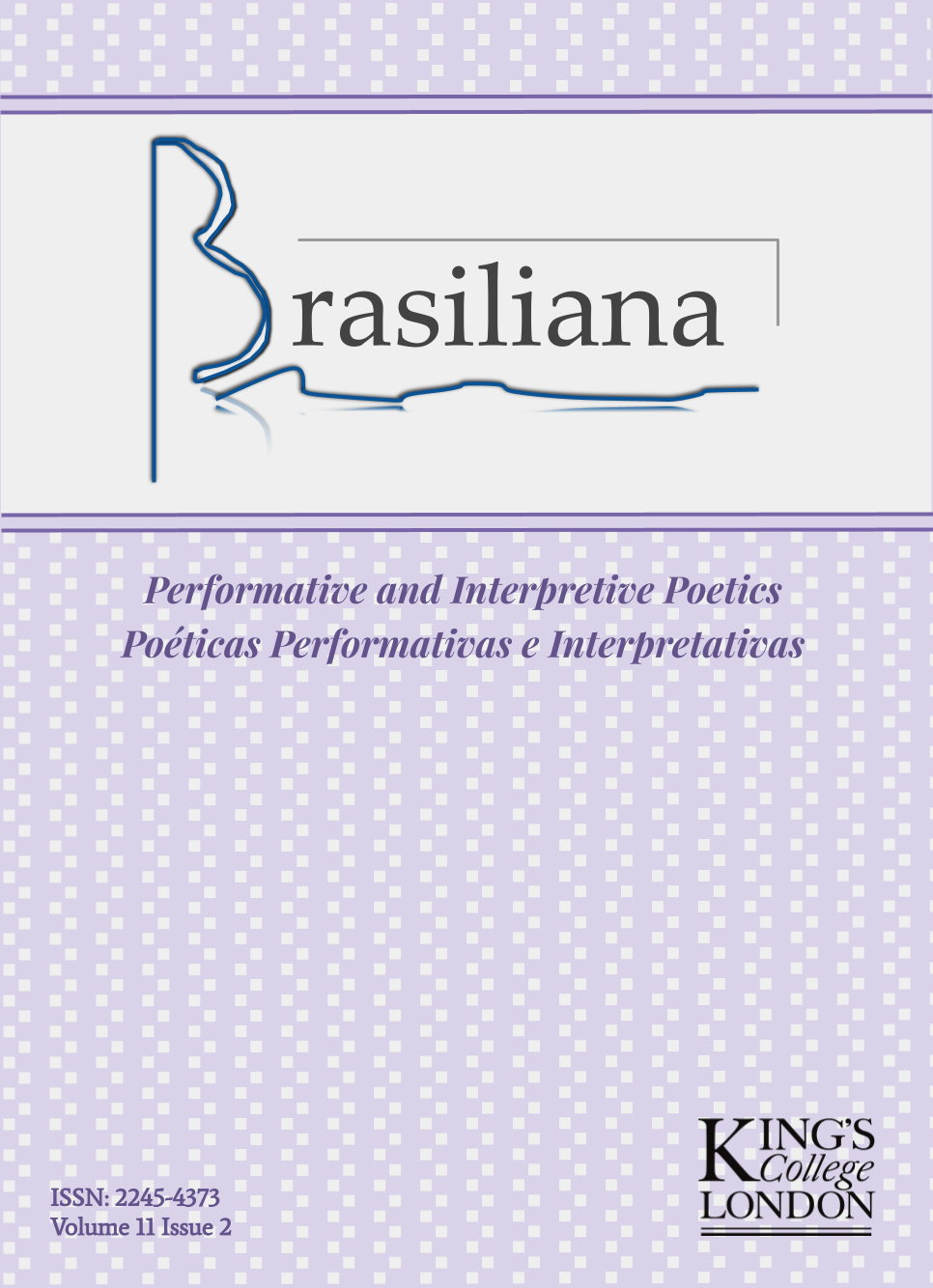MOVING AWAY FROM BRAZIL TO INTERPRET BRAZIL GILBERTO FREYRE AND SÉRGIO BUARQUE DE HOLANDA IN PERSPECTIVE
Main Article Content
Abstract
The sociologist and anthropologist Gilberto Freyre (1900-1987), author of The Masters and the Slaves (1933), and historian Sérgio Buarque de Holanda (1902-1982), author of Roots of Brazil (1936), are considered some of the main interpreters of Brazilian society, having produced works that continue to impact the understanding of Brazil, according to some researchers, these were the works that "invented Brazil". In this essay, I seek to analyze the impact of the experiences these authors had abroad during the production process of their best-known works. In the case of Gilberto Freyre, I highlight his academic training in the United States, and in the case of Sérgio Buarque de Holanda, his free training in Germany. I believe that due to different academic and cultural experiences abroad, Gilberto Freyre and Sérgio Buarque de Holanda developed different interpretations of Brazil. Based on the analysis of their biographies and their best-known works, I seek to highlight how some of the main interpretations of Brazilian society were only possible due to the "intellectual diaspora" in which these authors participated, trying to understand the influences permeating their work.
Article Details
![]()
Articles published in Brasiliana are licensed under a Creative Commons Attribution-NonCommercial-NoDerivs 3.0 Unported License.
When publishing open access, the author signs an author publishing agreement in which they retain copyright and give Brasiliana the right to publish the article. Our Open Access publications are distributed under the terms of the Creative Commons Attribution 4.0 International License, which permits unrestricted use, distribution, and reproduction in any medium, provided the original work is properly cited.
References
Araújo, R. B. (2005) Guerra e paz. Casa-grande & senzala e a obra de Gilberto Freyre nos anos 30. São Paulo: Editora 34
Bastos, E. R. (2006) As criaturas de prometeu: Gilberto Freyre e a formação da sociedade brasileira. São Paulo, Global.
Botelho, André, (2010) ‘Passado e futuro das interpretações do país’. Tempo Social. 22 (1), 2010. 47-66.
Burke, P. & Pallares-Burke, M. L. (2008) Gilberto Freyre: Social Theory in the Tropics. Oxford, Peter Lang Ltd.
Costa, S. (2014) ‘O Brasil de Sérgio Buarque de Holanda’. Sociedade e Estado. 29 (3), 823-839.
Feldman, L. (2013) ‘Um clássico por amadurecimento: Raízes do Brasil’. Revista Brasileira de Ciências Sociais, 28 (82), 119-140.
Freyre, G. (2003) Casa-Grande & Senzala. São Paulo, Global.
Freyre, G. (2012) Tempo morto e outros tempos. São Paulo, Global.
Hall, S. (1999) ‘Thinking the diaspora: home-thoughts from abroad’. Small Axe, 6, 1–18.
Holanda, S. B. (1982) ‘An interview with Sergio Buarque de Holanda’. Hispanic-American Historical Review, 62 (1), 3-17.
Holanda, S. B. (1995) Raízes do Brasil. São Paulo, Companhia das Letras.
Holanda, S. B. (2004) ‘Corpo e alma do Brasil – entrevista de Sérgio Buarque de Holanda’. Novos Estudos CEBRAP, 69, 2004, 3-14.
Lehmann, D. (2008). Gilberto Freyre: the reassessment continues. . Horizontes Antropológicos. 14 28, 2008, 369-385.
Mata, S. (2016) ‘Tentativas de desmitologia: a revolução conservadora em Raízes do Brasil’. Revista Brasileira de História, 36 (73), 63-87.
Meucci, S. (2015) Artesania da Sociologia no Brasil: contribuições e interpretações de Gilberto Freyre. Curitiba, Appris.
Motta, R. (2000) ‘Paradigms in the Study of Race Relations in Brazil’. International Sociology. 15 (4), 665-682.
Motta, R. (2008) ‘Reação a Max Weber no Pensamento Brasileiro: O Caso de Gilberto Freyre’. Estudos de Sociologia, 13, 185-206.
Oliveira, A. (2017) ‘Thirty years late: the actuality of Gilberto Freyre to Think Brazil’. Revista del Cesla. 20, 345-356.
Oliveira, A. (2019a) ‘A identidade disciplinar de Gilberto Freyre e a institucionalização acadêmica da antropologia no Brasil’. Etnográfica. 23 (3), 537-555.
Oliveira, A. (2019b). Afro-Brazilian Studies in the 1930s: Intellectual Networks between Brazil and the USA. Brasiliana: Journal for Brazilian Studies, 8(1-2), 32-49.
Oliveira, A. (2019c) ‘Gilberto Freyre e o Brasil Meridional’. Sociedade e Estado. 34 (1), 241–259.
Oliveira, A. (2021) ‘La Sociología como una Ciencia Social en Brasil’. Estudios Sociales. 60 (1), 125-141.
Pallares-Burke, M. L. (2012) O triunfo do fracasso: Rüdiger Bilden, o amigo esquecido de Gilberto Freyre. São Paulo, Editora UNESP.
Rocha, João Cezar de Castro, “Sergio Buarque de Holanda e Gilberto Freyre: raízes de uma rivalidade literária”. Dicta & contradicta, 9, 2012, 10-28.
Sansone, L. (2011). USA & Brazil in gantois power and the transnational origin of Afro-Brazilian studies.Vibrant: Virtual Brazilian Anthropology, 8, 536-567.
Schlegel, R. (2017) ‘Raízes do Brasil, 1936: o estatismo orgânico como contribuição original’. Revista Brasileira de Ciências Sociais. 32 (93), 1-37.
Sorá, G. (1998) ‘A construção sociológica de uma posição regionalista: Reflexões sobre a edição e recepção de Casa-grande & senzala de Gilberto Freyre’. Revista Brasileira de Ciências Sociais. 13 (36), 121-140.
Souza, J. (2019). A elite do atraso: da escravidão a Bolsonaro. São Paulo, Estação Brasil.
Vianna, H. (1995) O Mistério do Samba. Rio de Janeiro, Jorge Zahar/Ed. UFRJ, 1995.
Waizbort, L. (2011) ‘O mal-entendido da democracia: Sergio Buarque de Hollanda, Raizes do Brasil, 1936’, Revista Brasileira de Ciências Sociais, 26 (76), 39-62.

